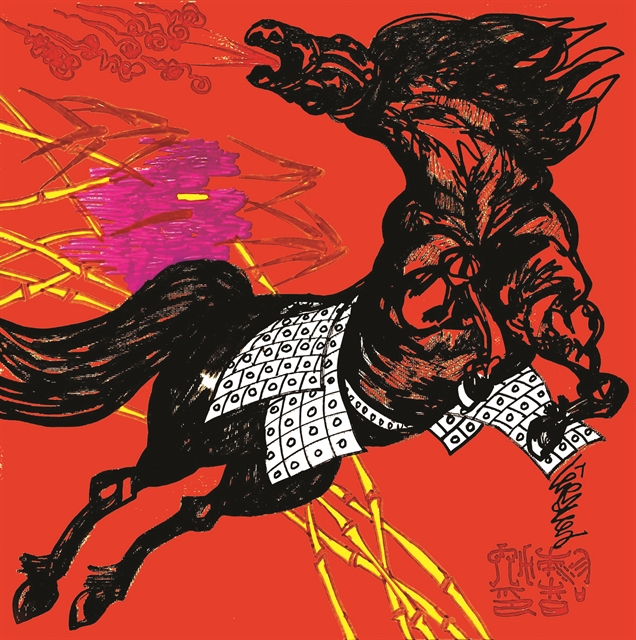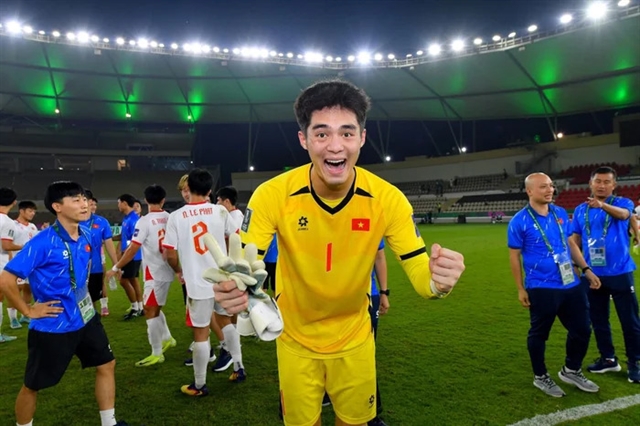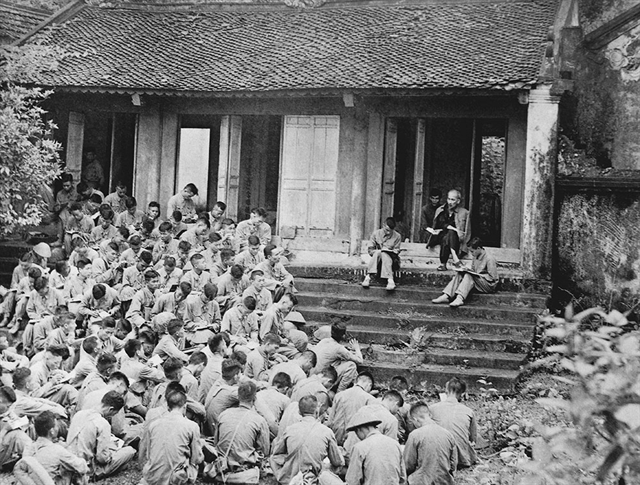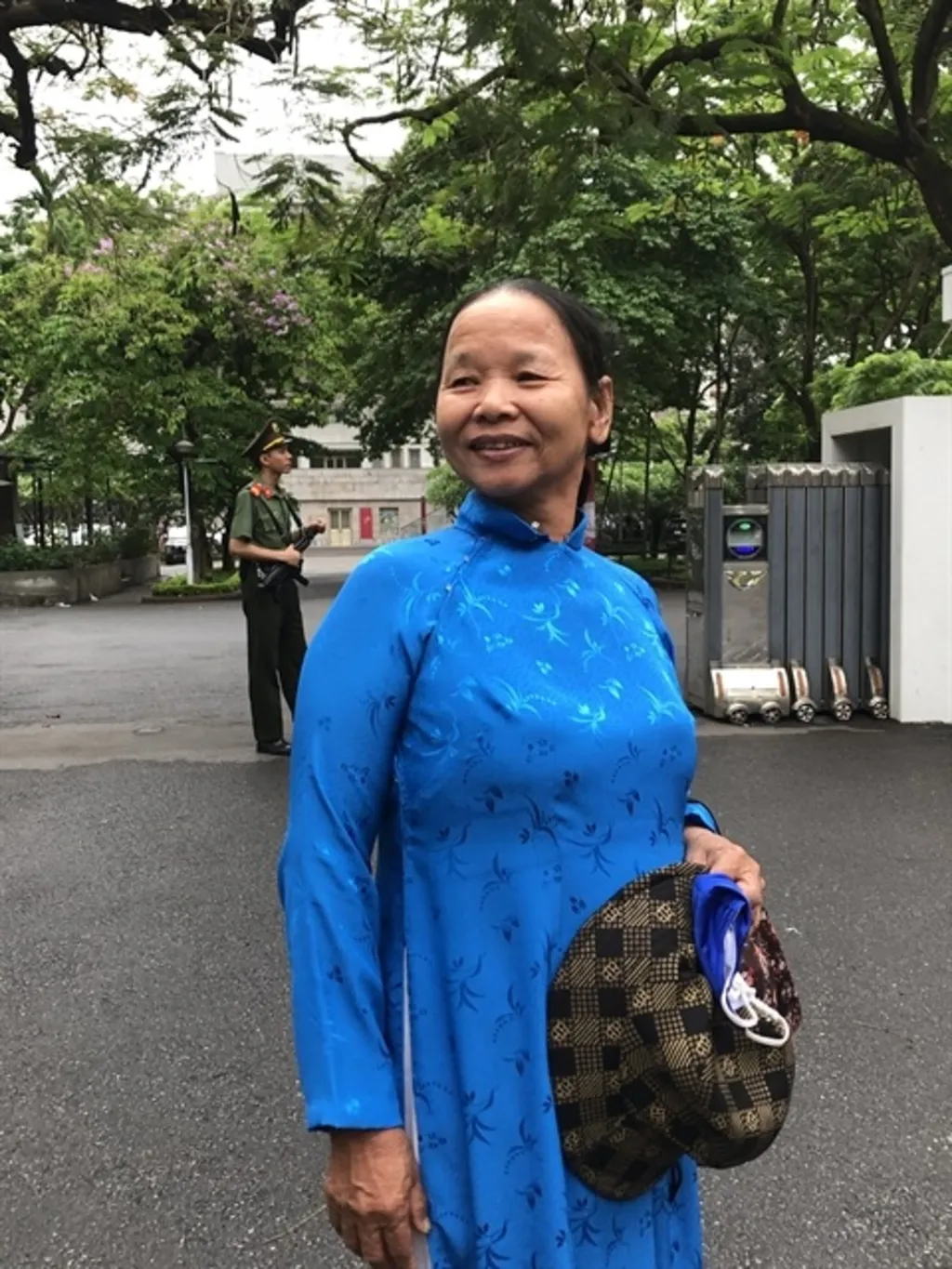 Life & Style
Life & Style

 |
| President Hồ Chí Minh addresses the Avant-Guarde Battalion at the Hùng Kings' Memorial Site on Nghĩa Lĩnh Mountain in Phú Thọ Province, saying: "The Hùng Kings have founded our nation, you and I must defend it." — Photo courtesy of Hồ Chí Minh Museum |
HÀ NỘI — A twenty nine strong group from Hải Phòng were among the earliest to stand in the queue to wait for the 7am opening of the long line to pay tribute to President Hồ Chí Minh on his official birthday, on the morning of May 19, 2025.
At 6am, they were all ready at the gate on Ngọc Hà Street in Hà Nội. "We started at 3am this morning in Hải Phòng," Đỗ thị Dung, 71, told Việt Nam News. "We wanted to go early on the day though many went earlier during the week."
People and the Government of Việt Nam celebrated the 135th official birthday of the Socialist Republic's founding father, President Hồ Chí Minh this Monday, May 19, 2025.
During the months of February, March and April leading to May, there was always a line of people visiting Hà Nội to pay tribute to the man whose utmost ambitious goals of his life was to make sure: "everyone have rice to eat, have clothing to wear and each and everyone gets an education."
Though we now know the exact time he breathed his last, on September 2, 1969, there has always been a mystery on the exact date on which the President was born.
The first national celebration of President Hồ Chí Minh's birthday was announced on May 18, 1946, less than a year after when he proclaimed Việt Nam an independent country on September 2, 1945.
The first year of the republic was a hard time, with foreign forces still trying to impose their powers on the country.
The French wanted to reclaim its former colony, which it surrendered to Japanese army on March 10, 1945.
On March 11, 1945, Emperor Bảo Đại announced Việt Nam's Independence with its title as The Empire of Việt Nam, and as a result, this decree eliminated all political agreements between Việt Nam and France, abolishing the Patenôtre Agreement signed in 1884, as well as all other protectoral agreements and other sovereignty agreements signed with France.
This decree has it that Japan granted independence to Việt Nam, and while proclaiming Việt Nam independent, it was composed by Japanese, asserting the leadership role of East Asia of Empire of Japan, as well as the right to expropriate all assets in Việt Nam by the Empire of Japan. It also led to the forming of new government with Trần Trọng Kim as the Prime Minister under Emperor Bảo Đại of the Empire of Việt Nam in April 17, 1945.
Current newspapers such as Sài Gòn, Điện tín (The Post) and Dân Báo in Sài Gòn, Tin mới, Trung Bắc Chủ nhật, Nước Nam and Đông Phát in Hà Nội, Ngày mới in Hải Phòng, Đoàn Kết in Vinh and Thanh niên in Nam Định ran editorials commemorating the new independence of the Empire of Việt Nam. Huge crowds of nearly 4,000 people were reported in Vinh, 15,000 in Hà Đông and a crowd of 100,000 people gathered in Sài Gòn while there was a big demonstration the size of which had never been seen in Thái Bình.
The so-called 'independence' of the Empire of Việt Nam had its strict regulations and limits, just as before under the protectorate of France, with no autonomy in foreign relations, no army, no financial independence. Historical document had it that four months after it was established, all ministers of the Trần Trọng Kim government together returned their positions: three resigned from their posts, one died from bombing, the rest reportedly said they couldn't do anything without Japan's approval.
In retrospect, the birth of the Empire of Việt Nam didn't have any real autonomous power. It was in the same situation as other occupied territories by the Japanese army during World War II, which were titularly independent, but all important policies were issued by Japanese.
When Japan unconditionally surrendered the Allied powers on August 14, 1945, Trần Trọng Kim on August 16, confirmed he would defend the Empire of Việt Nam. Two days later on August 18, Emperor Bảo Đại wrote letters to member countries of the United Kingdom, France, the United States and China, to request them recognise the Empire of Việt Nam as the government representing Việt Nam. All of those letters went unanswered as the Allied member countries would not recognise any puppet government established by the Empire of Japan in occupied territories.
On August 15, 1945, Japan surrendered to the Allied forces.
On August 25, 1945, during the height of the August Revolution, Emperor Bảo Đại abdicated from throne with a signature proclamation, "I'd rather be a citizen of a free country than Emperor of a slaved one."
What came after that, during the stormy August Revolution is now history: On September 2, 1945, President Hồ Chí Minh proclaimed Việt Nam an independent and free country.
 |
| Đỗ thị Dung, 71, got up at 3am to be ready for visiting Hồ Chí Minh Mausoleum at 7am on May 19, 2025. — VNS Photo Mỹ Hà |
Immediately after September 2, foreign forces tried all they could to threaten the young volatile independence of a new republic. The French army opened fire to recapture Sài Gòn and other Mekong Delta provinces, the Central Highlands, southern central coast provinces and were planning to advance to the North.
In the North then, nearly 20,000 troops of Chiang Kai-shek came in, they were looting, asserting their power and pressure on the government and people. The new provisional government was new and lacked everything that it needed to make a government functional. Despite its strong support by people and the Việt Minh front, the people were very poor, lacked basic essentials and a severe famine had killed two million people in the North in March the same year. There were the threat of floods during the stormy season and some localities were still beyond reach.
In the heart of the country, Hà Nội, members of other parties including Việt Quốc and Việt Cách came back in the name of Vietnamese expatriates returning home and made bold challenges to oppose, assassinate government officers, they protested and called for the government to change.
In his memoire, Lê Trọng Nghĩa, National Assembly Deputy, First Session, secretary at the Military Ofice Representative in the Joint government in 1946, a retired Major of Việt Nam People's Army recalled: "A severe cold winter was about to come in a very acute political and military situation. The country had to confront tidal waves front back and all around. In Hà Nội, many people were thinking or hoping for an 'iron hand' or a 'saviour' from outside to survive."
However an outside saviour never arrived and in fact, the very poor people who lacked all of life amenities under the leadership and vision of President Hồ Chí Minh had stood beside the young government and supported with all they had.
At the very first session, to win people's support to face the above-mentioned mounting challenges, the Provisional Government had issued most important decrees to fight the enemies of poverty, illiteracy and the foreign enemy. He thereby signed a decree on September 8, 1945 to open a National Election to vote for the National Assembly within two months.
Lê Trọng Nghĩa was quoted as saying, "We were young and carefree, still absorbed in the overflow of winning the revolution. We thought the actual election was a far-fetched idea, but when we actually held the ballots in our hands, we got really touched knowing that the new Hồ Chí Minh government had decided to let the ultimate deciding power be in the hands of the people at such a critical moment."
Then in March 1946, in a universal suffrage, the people of Việt Nam Democratic Republic cast their vote for the National Assembly and established the first joint-government to carry on resistance and country reconstruction. It was the first milestone to gather representatives from different political parties under a common goal to unite people from all walks of life chaired by President Hồ Chí Minh.
Today, when we look back at this critical time, it was a monumental achievement to respond to the country's timely needs to mobilise all people's resources and power in the fundamental united alliance of people at the very dawn of a young republic.
The prerequisite condition of forming an alliance government, President Hồ Chí Minh pushed forward a further step to sign a Peace Treaty on March 6, 1946 with France to restore peace in Việt Nam. France had to recognise this government, representing the people of Việt Nam and ceased their effort to continue any war.
As Việt Nam now has its own government, the Chiangkai shek army had to leave. But peace was no where near as leaders of the opposition parties secretly left the country.
In 1946, Leon Pignon, the experienced colonialist and advisor to D'Argenlieu assessed, that Hồ's government was too young, it didn't have any money, nearly no weapons and no allies, and predicted it would soon be crushed.
In May 1946, French High Commissioner General Admiral Thierry d'Argenlieu, the highest representative in Indochina was scheduled to arrive in Hà Nội. In the meantime, President Hồ and his government were working hard to make a membership in the French Union while d'Argenlieu did not want to accept Democratic Republic of Việt Nam in the union and suggested southern autonomy status for Cochinchina.
It was a critical time, and President Hồ needed to show the visiting French High Commissioner the support he had been receiving from the Vietnamese people.
One day ahead of the visit on May 18, 1946, Vũ Đình Huỳnh, the President's secretary from 1945-1946 wrote in his Memoire, 'The Flying Flag in August', that President Hồ walked into his office, saying: "Could you inform all cabinet members that tomorrow is my birthday. Don't forget to invite the children to come share the joy with me!"
"I looked at him in awe," Vũ Đình Huỳnh wrote, "How could this person, the utmost modest I've known, have given me the order to throw himself a birthday party?" No sooner than he could asked anything, he turned around to leave, saying "Do inform the people at Central offices and other social organisations as well that tomorrow is my birthday!"
Huỳnh immediately called the offices to announce the party preparations, with messengers going to visit all the offices that weren't connected by telephone.
"The next morning, the whole city of Hà Nội was bright with the red flags, and red banners stating Vietnamese people's will power to gain independence and President's birthday salutes," he wrote in his memoire.
The state banquet was held that night in the Presidential Palace. Outside streams of people marched on the streets cheering the President and shouting their wishes for an independent country. The youths, women and men, especially young children clad in their most beautiful outfits walked in long lines playing their little drums and singing songs on the streets around the Presidential Palace.
Hà Nội was vibrant with festive mood.
It was a stressful time, the government had to show its hospitability, yet the visiting high commissioner would not want to see Việt Nam independent, the joyful atmosphere by the people outside warmed the welcome, yet they were cheering their president's birthday, not the French guests.
It showed, as Vũ Đình Huỳnh wrote, "I believe that for President Hồ, even his birthday shall serve his people revolutionary benefit."
Overtime, more declassified documents shed light on his birthday, an ID from French archives showed that his birthday, according to student documents, was on January 15, 1894, other documents had that he was born in 1892. His official birth year was 1890, which many believe was decided as a convenience for the public, the average Vietnamese person in 1946 was still poor and illiterate.
Further more, celebrating one's birthday now become a joyful occasion for everyone. But 80 years ago, Vietnamese people only remember their ancestors' death anniversary. Celebrating birthdays was primarily a western tradition reserved only to those worked for the French.
Seventy nine years have passed since that milestone birthday, Việt Nam today has become an independent country with growing international position and celebrating his birthday has become very joyful and normal occasion. — VNS